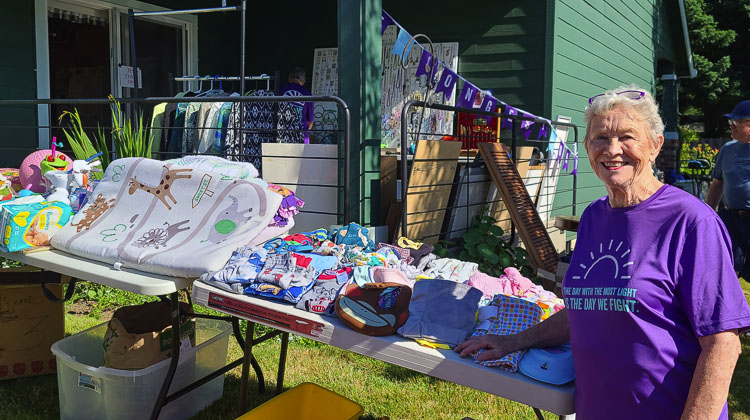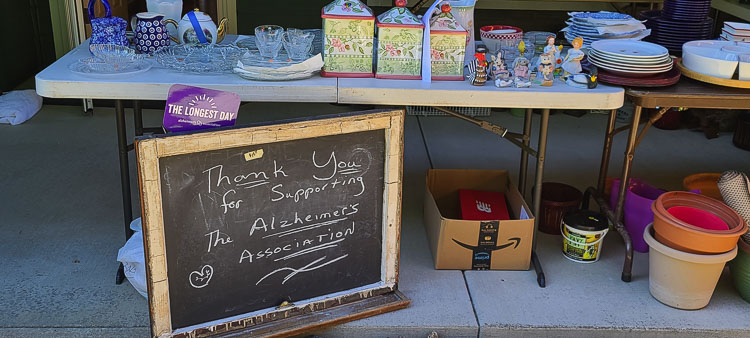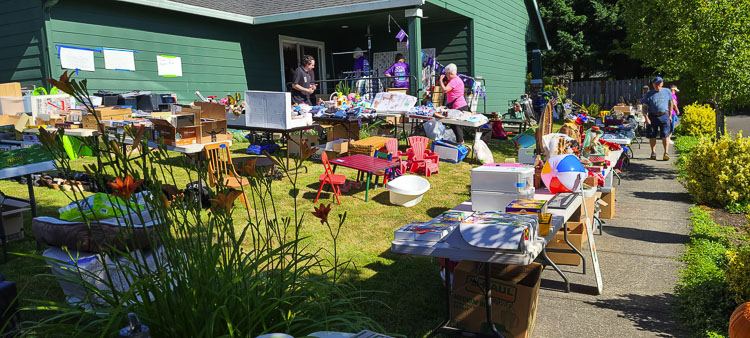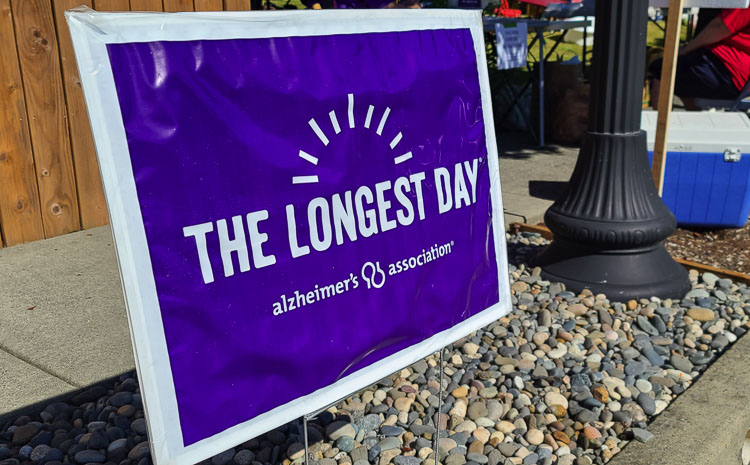The Longest Day is a world-wide fundraising campaign
BATTLE GROUND — For years, she worried she would suffer from it, too.
She still has concerns for her younger family members.
That is why Colleen Hoss cares so much. That is why Colleen Hoss is all about The Longest Day.

The Longest Day is Sunday, but the campaign to raise funds for Alzheimer’s research, a search for the cure, has already started.
In Battle Ground, Hoss and her neighbors are holding a sale.
“It’s a typical yard sale … on steroids,” Hoss said.
More than 40 people donated items for the sale that surrounds three sides of her home. Plus there are another half-dozen other yard sales throughout her neighborhood, all for The Longest Day.
“Every last penny goes to Alzheimer’s,” Hoss said.

Her mega sale is at 213 NE 18th Street in Battle Ground and runs today (Friday) through 4 p.m. and then will be open again Saturday from 9 a.m. to 4 p.m.
“My grandmother, and three of her four daughters, my mother included, all died of dementia,” Hoss said. “They were all in care by their early 70s.
“That’s something that has always hung over my head: Will that be me? So I played hard, did fun things, and did whatever I could,” Hoss said. “My early 70s came and went, and I’m still doing fine in my late 70s. But I don’t want my son or my granddaughter to have this hanging over their heads for their lives. That’s why I think finding a cure is critical.”
The Alzheimer’s Association notes that the longest day of the year, the summer solstice, is the day with the most light. The association asks people from across the world to fight the darkness associated with Alzheimer’s through a fundraising activity of their choice.

Hoss notes that this campaign is also for caregivers who work with patients with Alzheimer’s.
“For caregivers, the day never ends,” Hoss said. “The Longest Day is to shed a light on Alzheimer’s and the hard time that caregivers have.”
Hoss started raising funds for research a few years ago.
During treatment, her mother used to love two things: Sing-a-longs, and ice cream socials.
“I thought, ‘I could do an ice cream social and just have friends come by, have a bowl of ice cream, and they can make a donation,” Hoss said.
She had around 30 or 40 friends in her living room.
Now, she has partnered with Menchie’s Frozen Yogurt in Battle Ground for a fundraising day. She did that earlier this month.

Now, the fundraising focus is all on the yard sale. Hoss and her team of helpers have been receiving items for the past two months. The last two weeks have been hectic. Collect. Sort. Price.
Clothes. Shoes. Books. Records. Electronics. Sporting goods. Furniture. Silverware. Puzzles. Stuff for all ages. You know, the norm for a yard sale, only this sale has items from dozens of people.
Hoss said she is grateful for all the help. And for all the conversations she has had in getting the word out about the fundraiser.
“When I start to talk about Alzheimer’s, they can tell me about someone in their family, or a friend,” Hoss said. “Anyone you talk with, generally, they have a story to tell.”
The sale opened Friday morning at 9 a.m. and Hoss and her team were already making sales by 9:05 a.m.
“I just appreciate the people of Clark County and how much they come forward as far as hearing about Alzheimer’s and wanting to find a cure as much as I do,” Hoss said. “It’s a wretched disease.”
The Alzheimer’s Association Oregon and Southwest Washington offers five suggestions to promote brain health during Alzheimer’s and Brain Awareness Month.
Recommit to brain-healthy basics
Healthy behaviors took a back seat for many Americans during the pandemic. Many experts agree that people can improve their brain health by adopting healthy lifestyle habits, including: regular exercise, a healthy diet, getting proper sleep, and staying socially active.
Return to ‘normal’ at your own pace
Get active, but for those who are feeling anxiety about the return to norms, take it slow.
“For those feeling anxious, the Alzheimer’s Association suggests taking small steps. It may be important to set boundaries and communicate your preferences to others in your social circles.”
Help others
Research shows that helping out others not only makes you feel better, it can be better for your health.
Unplug and disconnect
To avoid overload, experts suggest setting time limits for screen time. Disconnect from devices at bedtime, as well.
Control stress
Do not let stress control you. Meditation. Exercise. Listen to music.




